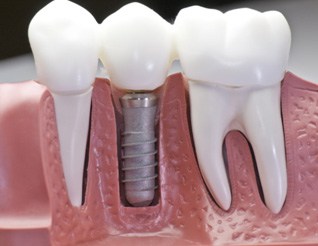Dental Implants in Whitehouse, OH

One or several missing teeth can affect more than just your willingness to smile. Not only can it impair your ability to chew, eat and speak properly but it also puts you at risk for serious oral health problems.
Whether you are embarrassed by a gap in your smile or are experiencing poor oral health due to missing teeth, dental implants in Whitehouse can help. Made of high-quality materials, dental implants from Dental Health Associates are designed to be strong, natural looking and last for many years. Dr. Huntzinger of Dental Health Associates of Whitehouse have years of experience treating hundreds of patients in Whitehouse and the surrounding Ohio area who desire a long-lasting solution to missing teeth. Let our team help you eat, speak and smile confidently again with dental implants.
What Is a Dental Implant?
A dental implant consists of three parts: a titanium post that is surgically inserted into the jawbone, a dental restoration (either a crown, bridge or dentures) and an abutment that connects the two together.
Dental implants are preferred by many patients and dentists because they offer a long-term solution to missing teeth. Implants are surgically fused with your jawbone, meaning they are stable and will not shift in the mouth. As a result, you can chew and eat with ease again and not worry that your teeth will slip out. Filling in gaps left by missing teeth also helps the surrounding teeth stay in place. In addition, dental implants stimulate the jawbone, preventing bone deterioration and the collapse of the facial structures. Finally, dental implants are crafted to match the look of your natural teeth, giving you a smile you can be proud to show off.
Am I a Good Candidate for Dental Implants?
Candidacy for dental implants is determined on a case-by-case basis by our dentists. To better help our patients determine if they would benefit from dental implants we have compiled some key points that make a good candidate.
- Missing tooth or even teeth
- Healthy gums
- Non-smoker since smoking can hinder the healing process
- It is important for candidates to have enough jawbone to support the implant
- Good overall health as certain illnesses can interfere with the healing process of dental implant treatment
During your initial consultation with us, our dentists will thoroughly examine your teeth and gums, and evaluate your medical history to determine whether dental implants are a good option for you.
Understanding the Dental Implant Process

Dental implants are typically placed over the course of two visits. During your first visit, we will take measurements and impressions of your mouth and teeth, which will be used to craft your custom-made implant in a dental laboratory. Next, we will surgically place the titanium post into your jawbone while you are under local anesthesia. Before placing your permanent restoration, the implant must integrate with the bone. This process, known as osseointegration, typically takes six months to complete. In the meantime, a temporary crown will be placed over the post. Once your jawbone is completely healed, you will return to our office so we can place your permanent restoration.
With proper care, your dental implants can last for many years. Good oral hygiene, including brushing twice a day and flossing daily, is essential for keeping your implant looking and functioning properly. Routine dental exams are also imperative so our team can monitor the health your dental implant.
Potential Procedures Before Receiving a Dental Implant

Some of the patients at Dental Health Associates of Whitehouse need a procedure before they can start the dental implant process. If you have an extremely infected tooth that your dentist suggests replacing with a dental implant, you will need to have the tooth extracted first. However, this is only done when there is no plausible way to maintain the natural tooth in your mouth.
To implant a dental implant, it is important that you have a jawbone strong enough that it can hold a metal post. If your jawbone has atrophied significantly — which is likely to happen if it has not had tooth roots to keep it strong for an extended period — then your dentist may need to start by performing bone grafting surgery. For this procedure, donor bone is attached to your jawbone. It is then given time to meld with your natural bone, and once it is strong enough, the post can be inserted.
Dental Implant Recovery
You will notice some discomfort in your jawbone after the post is inserted for about a week, but this can be managed with prescribed pain medication. Be judicious with your diet at first, favoring foods that are soft and mild in temperature to avoid further aggravating your tender gums. You may use an ice pack for several minutes at a time to reduce swelling. Discomfort should be much less significant when you have the final implant added to the post months later.
To find out if dental implants can help you eat, speak and smile again, schedule an appointment with Dental Health Associates of Whitehouse. Contact our office or send us an email today.
Dental Implants FAQ
How long does the process take?
The complete procedure, from start to finish, may require as few as three office visits. Because the new artificial roots need to become secure in the jaw, and the bone needs time to fuse with the new roots, a period of healing is required between appointments. Because of that, the process may take six months, although more complex cases that require jaw surgery or bone grafting could add an additional three months to the timeline. The amount of time you spend in the dental chair is not much different from the time required for many other routine dental procedures.
How durable are dental implants?
Your dental implants are anchored with titanium roots, and titanium is one of the strongest materials on the planet. Eventually these roots will fuse with your bone, creating an incredibly strong bond. These advanced implants are actually more resilient than most natural teeth. You can expect an implant to endure at least 30 years or longer.
How many dental implants can I receive?
You may choose to receive as few as one and as many as an entire set. You can also decide to use a limited number of implants to anchor dentures or a dental bridge. Some patients choose two implants for the upper or lower mouth to provide a foundation for bridges or dentures. A specific type of dental restoration process involves a new and extremely self-descriptive technology known as All-on-Four. Using this technique, fabricated arches are held in place by four dental implants in the upper mouth, lower mouth or both areas. The key to the stability of this procedure is to space the implants in specific areas of the mouth that will allow a broad and well-balanced foundation for your dental bridge.
Is the process painful?
Reading the details of the procedure, a prospective patient might get the impression that the process involves major surgery and features the usual discomfort we associate with surgical procedures. In fact, the technology is now so advanced, and the process is so routine, that most of the discomfort you feel will be at home, after the anesthesia has worn off; and this can be comfortably controlled with medication your dentist will prescribe for you. The implantation of the titanium roots can be done with local anesthetic or IV sedation. Many patients have compared the sensation to the level of discomfort one would feel during a minor tooth extraction.
Why are dental implants superior to dentures?
Implants have many advantages over dentures. Chief among these benefits is the fact that you won’t have to think about your implants at all during the day. They need no special maintenance and do not need to be removed for cleaning, or any reason. They will not embarrass you by slipping, nor will they limit your eating choices. Best of all, the titanium roots stimulate the bone of your jaw the same way your natural roots do. Without this stimulation, the bone will atrophy, potentially changing your entire facial profile.


